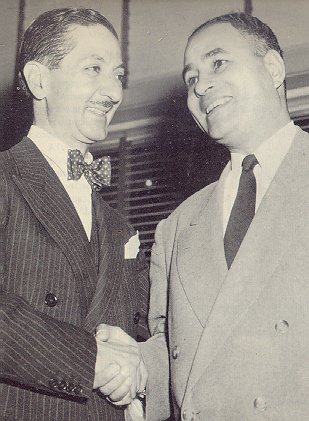< Previous Page * Next Page >
The United States demonstrated its hostility to colonialism and its support of the principle of self-determination in other areas. In 1946, President Truman proclaimed the full independence of the Philippines. The following year Congress authorized the Puerto Ricans to elect their own governor, as a step toward becoming a self-governing commonwealth in 1952, associated with the United States on the basis of common citizenship and free choice. American leaders encouraged Great Britain in its decision to grant independence to India, Pakistan and Burma, and served as mediators to expedite the independence of Indonesia from Dutch rule. In 1949 President Truman advanced his "Point Four" program to speed up U.S. technical and financial assistance to the newly developing areas of the world. Under this program, American specialists in agriculture, education, public health, housing, and many other fields provided help and advice to countries throughout Asia, Africa, and Latin America.
As these new nations were emerging politically and economically, the war-ravaged
countries of Europe faced severe economic difficulties. In a speech at Harvard
University early in June 1947, Secretary of State ![]() George C. Marshall suggested a
sweeping program to restore the economies of Europe. The "Marshall Plan," as this
program came to be called, offered American money, supplies and machinery to any
European nation that wished to participate. (Although they were included in the offer,
the U.S.S.R. and its East European satellites declined.) The massive program of American
aid, involving $12,000 million worth of goods and services, wag launched in April 1948.
It helped bring rapid economic recovery to 16 countries from Iceland to Turkey.
Within less than three years, industrial production rose to 25 per cent above pre-war
levels and agricultural output to 14 per cent above pre-war.
George C. Marshall suggested a
sweeping program to restore the economies of Europe. The "Marshall Plan," as this
program came to be called, offered American money, supplies and machinery to any
European nation that wished to participate. (Although they were included in the offer,
the U.S.S.R. and its East European satellites declined.) The massive program of American
aid, involving $12,000 million worth of goods and services, wag launched in April 1948.
It helped bring rapid economic recovery to 16 countries from Iceland to Turkey.
Within less than three years, industrial production rose to 25 per cent above pre-war
levels and agricultural output to 14 per cent above pre-war.
Even as the Marshall Plan was getting under way, a critical situation developed in West Berlin, which was occupied by British, French and American forces. The presence of this prospering, democratic, pro-western community 110 miles inside the Soviet zone of East Germany was a source of embarrassment to the communist leadership, Hoping to force the western powers out of Berlin, Soviet authorities in the spring of 1948 first restricted and then totally blocked road and rail traffic between Berlin and the Western Zone of Germany. The British-American answer to this Soviet challenge was the Berlin airlift. Starting in the summer of 1948 and continuing for nearly a year, British and American planes transported more than 2 million tons of food, fuel, drugs and other necessities to the people of West Berlin. The Russians, finally convinced that their maneuver had failed, lifted the blockade in May 1949.
The Berlin crisis, following the expansion of Soviet influence in East Europe and the threats against Greece and Turkey, aroused growing alarm throughout western Europe. As a consequence, the North Atlantic Treaty Organization (NATO) was established in April 1949, to coordinate the military defenses of member nations against the possibility of Soviet aggression. Belgium, Canada, Denmark, France, Great Britain, Iceland, Luxembourg, the Netherlands, Norway, Portugal, and the United States - with Greece, Turkey and West Germany joining afterwards - agreed to consider an armed attack against any one of them as an attack against all. In December 1950 General Dwight D. Eisenhower was appointed Supreme Commander of the NATO forces.
U.S. involvement in international affairs during the Truman administrations was not confined to Europe. In 1948, the United States joined 21 Latin American nations in forming the Organization of American States, which was designed to insure the peaceful settlement of inter-American disputes, promote economic and social development in Latin America, and provide for common action in the event of aggression. This organization was the successor to several other interAmerican groups of states, the idea for which had been proposed by Simon Bolivar almost a century and a half ago, the first of which came into existence in 1889.
 |
| Dr. Ralph J. Bunche (right), Under Secretary of the U. N. and American winner of the 1950 Nobel Peace Priye, ist congratulated by Nasrollah Enteyam of Iran, President of the United Nations general Assembly at the time of the award. |
In the Middle East, when the proclamation of the independent Jewish state of Israel
in May 1948, plunged that country into war with its Arab neighbors, the United States
supported the successful efforts of a U.N. truce team to arrange an armistice. For his
work as head of this team, ![]() Dr. Ralph Bunche, the grandson of an American slave,
received the Nobel peace prize.
Dr. Ralph Bunche, the grandson of an American slave,
received the Nobel peace prize.
< Previous Page * Next Page >